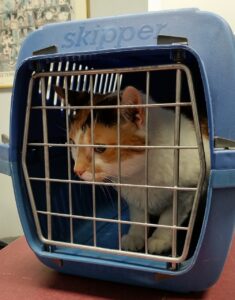Cats are beloved companions in millions of households worldwide, bringing joy and comfort to their owners. However, as with any pet, cats are vulnerable to a variety of parasites that can cause significant health problems if left untreated.
Parasites such as fleas, ticks, heartworms, and intestinal worms are common in cats and can be difficult to eradicate once an infestation has occurred. Fortunately, there are steps that cat owners can take to prevent and treat parasite infestations, ensuring that their feline friends remain healthy and happy.
In this blog post, we will explore the various parasites that can affect cats, their symptoms, and the most effective methods for prevention and treatment. Whether you’re a new cat owner or have had feline companions for years, this post will provide valuable information to help keep your cat parasite-free.
Heartworms in cats
 Cats can get heartworms when an infected mosquito bites them. The mosquito transmits the heartworm larvae, which then migrate to the cat’s heart and lungs, developing into adult heartworms. The process of development from larvae to adult heartworms can take several months.
Cats can get heartworms when an infected mosquito bites them. The mosquito transmits the heartworm larvae, which then migrate to the cat’s heart and lungs, developing into adult heartworms. The process of development from larvae to adult heartworms can take several months.
Cats are not the natural host for heartworms, meaning they do not thrive as well in cats as in dogs. However, even a few heartworms can cause significant health problems for cats, including respiratory distress, coughing, vomiting, and weight loss.
It is important to note that heartworm prevention is available for cats, and it is recommended that all cats be placed on preventive medication to reduce the risk of infection. If you are concerned that your cat may have heartworm disease, it is crucial to speak with your veterinarian, as prompt diagnosis and treatment can help prevent serious health problems.
Heartworm disease can be devastating for cats; it could even prove fatal in severe cases. To protect your cat from infection and other parasites associated with heartworm disease, they must take an effective preventative medication.
Once your cat has been diagnosed with heartworm disease, you must continue to see your veterinarian and potentially an animal cardiologist for regular check-ins. Your vet must perform blood tests and radiographs to diagnose your pet’s condition accurately.
Heartworm infection in cats can result in serious respiratory problems such as coughing, wheezing, and difficulty breathing. If left untreated, heartworm infection could progress to pneumonia or other serious complications.
Your cat may require oxygen therapy, heart medications, intravenous fluids, and antibiotics to recover from this potentially fatal infection. Depending on its severity, they may require oxygen therapy, heart medications, intravenous fluids, and antibiotics for recovery.
Once your cat has been diagnosed with heartworm, it should receive monthly medication to eliminate the worms from its system. Various drugs are available to do this, and each has different properties, so consult your veterinarian about the most suitable option for your pet’s needs.
Heartworm medications come in three common forms: pills, spot-on topicals, and injections. Be sure to read the instructions carefully to administer these safely and effectively.
These drugs target heartworms at their immature stage, making them safe and effective for your cat. Unlike some stronger medications dogs must take, these won’t be toxic to your feline companion.
Fleas
 The flea is one of the most widespread parasites that affect cats. Unfortunately, it also carries a disease called Dipylidium caninum which can be spread by inhaling flea saliva. Therefore, treating your household for fleas is highly recommended to protect your furry friends from contracting this serious illness.
The flea is one of the most widespread parasites that affect cats. Unfortunately, it also carries a disease called Dipylidium caninum which can be spread by inhaling flea saliva. Therefore, treating your household for fleas is highly recommended to protect your furry friends from contracting this serious illness.
Cats often suffer from various types of fleas, including:
Ctenocephalides felis, commonly called the cat flea, is a reddish brown parasite growing up to 2mm long and feeding on blood-sucking insects such as cats. Because these pests feed so efficiently on cats’ blood, they have become common targets for pesticides and other chemicals used against them.
This is the most prevalent type of flea that can infest a house. It lives on both dogs and cats, making it highly hazardous for both pets and humans.
These tiny parasites usually hide in upholstery or soft furnishings, making it difficult to detect them until a large infestation is present.
Fleas typically feed off their host’s blood, though they also take advantage of other animals and humans, such as birds or lizards. Thanks to their powerful long legs, fleas can jump a considerable distance.
It is essential to comprehend the life cycle of these parasites to eliminate them effectively. They begin as eggs that remain dormant for 2-12 days before hatching, and after hatching, they undergo various stages until becoming an adult.
The adult flea is a dark reddish-brown insect with an oval body and long legs. Its mouth looks like a tube, allowing it to suck blood from its prey.
You can choose oral medications or topical “spot-on” solutions to treat your pet for fleas. Popular products include Frontline(r)/Frontline Plus, Advantage(r) II, Revolution(r), Vectra(r), and Comfortis (an oral tablet).
You can also use a natural spray that contains geraniol oil to eliminate fleas on contact. The spray works by dehydrating the flea’s exoskeleton and blocking their breathing; additionally, it dehydrates eggs and larvae, thus preventing further infestations. However, this solution should only be temporary.
Ticks
Ticks can be a significant issue for your cat, especially if they spend much time outdoors or live in areas where ticks are common. Not only do they carry diseases like Lyme disease and Rocky Mountain Spotted Fever that could prove fatal if left untreated, but ticks also carry diseases that carry their diseases like Ehrlichia.
To prevent ticks on your cat, the best way to protect them is to keep them indoors or in a yard with reasonable grass control. Once inside, use a flea comb on the cat daily to check for any ticks that may be present.
Once you’ve identified a tick on your cat, take it to your veterinarian for safe removal and proven treatments. They can tell you which type of tick and which treatment is most suitable.
Various tick medications are available to protect your cat from contracting these blood-sucking parasites. These may include topical ointments, collars, and oral medications – so be sure to discuss which option best fits your pet’s lifestyle and location with your vet.
Bravecto (itraconazole): This topical solution for cats is intended to be applied directly onto their skin and is effective against Dermacentor variabilis and Ixodes scapularis ticks in Canada; Lone Star and brown dog ticks may also be controlled in the U.S., where it’s indicated for the control of these pests.
Advantage II (flumethrin, imidacloprid): This collar fits around your cat’s neck and offers up to 8 months of protection against American dog ticks, deer/black-legged ticks, and Lone Star ticks. It is suitable for cats older than ten weeks of any weight.
Cockroach sprays and lawn treatments with pesticides successfully eliminate ticks in your backyard or property. The pesticides kill ticks before they attach to your cat, while the roach spray kills the larvae of cockroaches that feed on them.
Ticks are smaller and easier to spot than fleas, so you can quickly and easily remove them from your cat with tweezers. Additionally, clean the bite site with hand sanitizer or rubbing alcohol to disinfect it and eliminate lingering biting mites. Afterward, submerge the tick in either rubbing alcohol or iodine to help it die.
Intestinal Parasites
Intestinal parasites can lead to infections in cats and make them very ill. Anti-parasite medications are available that kill parasites while also keeping them from returning.
Humans and cats are susceptible to intestinal parasites such as protozoal and helminths. While protozoal infections and diarrhea usually resolve on their own, helminth infections often necessitate medical intervention.
Parasites in the digestive tract are microscopic organisms living within humans that can damage and deplete their immune systems. Healthy people usually fight off these parasites without experiencing any symptoms, but others may develop serious health complications.
Parasitic worms such as roundworms and tapeworms are the most prevalent parasites in the gut. These critters can cause serious illness or even death in some instances.
Adult cats can acquire worm infections by eating a rodent with an existing worm or ingesting fleas carrying immature worms. If you suspect your cat might carry one of these parasites, consult your veterinarian about the best way to protect against further development.
Deworming products for cats are available to kill parasites in their digestive tract and prevent them from returning. These treatments are both efficient and user-friendly.
Intestinal worms are easily identified through a simple fecal test administered by your veterinarian. During this examination, you’ll need to bring in a stool sample which will then be placed into a solution that causes parasite eggs to separate from the waste and float to the top.
If the fecal test results for an intestinal parasite are positive, your veterinarian can prescribe medication to address the issue. These drugs may need to be taken daily or administered every few weeks for several months.
Cats often contract roundworms and tapeworms, intestinal parasites that can cause weight loss, weakness, diarrhea, and other symptoms.

